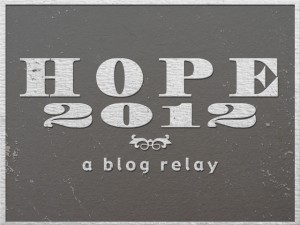
It is relay time, and the baton passes from Ed Blum to Mike Altman to me. Can I just say I am no good at relays?
Yet, the baton in hand came with a challenge, and I cannot back down from one of those. When Mike tagged me, he wrote, “She usually writes about hate but now we’ll see if she’ll write about hope.” In my head, his statement reverberated as I worked through it slowly. She usually writes about hate, which is painfully correct. But now we’ll see if she’ll write about hope, which is the part that troubles me. The juxtaposition between hate and hope makes the chasm between the two emotional states, or perhaps affects, seem wide, gaping and comfortably distant. Hate must be the opposite of hope, the promise, the desire, the wish, the aspirationally positive. Never the two shall meet.
Yet researching and writing about hate convinces me that the chasm is actually a fine-edged crack, like any of the ones my daughter gleefully bounds over and back, over and back. Those marked by hate also hope for their vision of the future, which looks unlike ones we might want to fathom (or perhaps not). Their hope conjures violence and trauma, and only then utopia. Surely, their hope is not the same as ours. Yet, it is. They hope for different outcomes that are positive for them. They also despair in failed hope. Common practices of hope, however, don’t redeem the hurt, the harm, or the despair that follows in the wake of hatred. Hope, however, can be found there. A person’s vision of hope does not always appear positive or beneficial.
This is not to disparage hope, even I am not that cynical, but to say that the term is employed not always to optimistic ends. Aspirations are never inherently positive. Our hopes can sometimes harm us, as Lauren Berlant cautions in her Cruel Optimism. Sometimes the mere ability to hope saves us even in the face of dire reality or the wearying ordinary. For me, hope is at best ambivalent.
This doesn’t mean that I discard hope nor does it mean that I am mired in pessimism or her scolding twin cynicism. I hope, albeit cautiously. I worry. I despair. But, I am also an optimist. My work, even though I catalog hate, is born of optimism and the fervent hope that scholarship can help make the world a better place. If we understand how hatred functions, how hope can be a pivot for darker emotions, then maybe we identify the nefarious when it looks harmless.
This seems almost embarrassingly naive even as I type this. My snarkier self rolls her eyes at what Berlant would likely label “stupid optimism.” My optimistic outlook appears half-cocked when contrasted to the complexity of our world, a mere hopeful fantasy of the way the world could work. My hope is that scholars can make a difference, and I am not fatalistic enough to think that our research and our writing doesn’t matter. Yet, my hope endures.
When I write and teach about hatred, when my students see the trauma of ideologies and actions, when I cajole other scholars to take seriously intolerance and violence, when I point out that systematic violence and oppression, I hope that I make a difference, no matter how small. I hope that attention to harm and hate create less of it in the world. I hope my teaching and research help not hinder. I hope because sometimes that is all one can do. Hope endures and sustains, which might be enough.
The baton now goes to:
Per D. Smith, how does hope fit (or not) with irreligion?
Historiann, my favorite blogger, might we problematize hope rhetoric? (Here’s one example).
Karen Cox, what is the character of hope in representations of the South?
Scott Poole, does horror contain hope?
Someone please take that baton.
First, let me say THANK YOU for picking up the baton. The project is turning out to be so, so beautiful, precisely because of thoughtful responses like this.
Second, your contributions are touching on a thought that Kristen Mae at Abandoning Pretense (another participant in the HOPE 2012 blog relay) had when she said that, “the intensity of your fear is only the inverse manifestation of the depth of your hope.”
I love that all of these voices of hope are adding up to a such a rich review of the topic.
Thank you again. Words; they really can make the world a better place.
Pingback: Hope Blog Relay: Ordinary Hope « James W. McCarty III
Pingback: Hope Blog Relay: Ordinary Hope « James W. McCarty III
Pingback: Hope 2012: Closing Ceremonies « Melanie Crutchfield